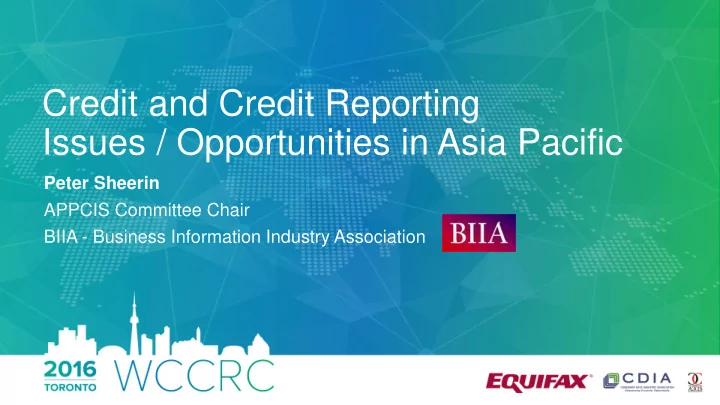

Credit and Credit Reporting Issues / Opportunities in Asia Pacific Peter Sheerin APPCIS Committee Chair BIIA - Business Information Industry Association
Key Takeaways from Regional Developments • APEC Finance Minister Conference on Financial Infrastructure – Creation of Financial Infrastructure Development Network (FIDN) • The Mekong Cross Border Pilot • Legislative / Regulatory Impact • FIJI – Fair Reporting of Credit Act 2016 (perhaps ‘Unfair’ Credit Reporting Act ) • China regulates control of P2P Lending (FINTECH is put on a tight leash) • New Data Sources - Payment Banks / Telcos / Insurance • Indian CICs request RBI to mandate broader data sharing • Australia FinTech companies demand access to bank data • Big Data - Future challenges - Policy/Regulation 2
APEC Cebu Action Plan – Mekong Cross-Border Pilot Scope . Progress. • APEC/ABAC Established Financial BIIA joined FIDN – participated in a series of Infrastructure Development Network (FIDN). meetings on Financial Inclusion • Establish legal frameworks for CIS based on April 2016 -Established industry steering General Principles for Credit Reporting. committee / work plan to advance data dictionaries / implement cross-border • Develop model language for regulations sharing pilot / baseline study on credit governing sharing public data with CISs ’. information sharing practices / laws. • Evaluate benefits common data BIIA commenced creation of data dictionary. format/dictionary. July 2016 Meeting of Mekong credit • Evaluate benefits/challenges of cross border information sharing involving CIS’s from sharing of credit information to support China, Thailand, Vietnam, Cambodia, Laos. trade/investment. Agreed principles / next steps creating framework. IFC/BIIA collaborating on creation of bilateral sharing agreement and legislative challenges. 3
Legislative / Regulatory Impact FIJI – Fair Reporting of Credit Act 2016. • Prompted closure of bureau after operating since 2001 and database confiscation. • Legislation provides for substantial criminal sanctions. • Negative impact on any new owner/operator. • Bureau operations in Tonga, Vanuatu and Samoa adversely impacted. China regulates control of P2P Lending. • Tightens control of P2P lending companies. • Cracks down on illegal platform fundraising activities / preventing financial risks. Provides standards, information, intermediaries, and risk monitoring and early warning systems. • Emphasized P2P companies role of as financial information service intermediaries providing assessment / exchange of borrower information for unrelated borrowers / lenders via internet platforms. 4
New Data Sources - Payment Banks / Telcos / Insurance India: • CICs urge RBI to mandate Payment Banks as members of CICs to share transaction performance data. • Payments banks are not into lending, but payment transactions will help understand borrowers. • RBI receptive - requires amendments to Credit Information Companies (Regulation) Act. • Potential win / win - Payment Banks able to utilise CIC’s customer acquisition tools. • CIC’s also seeking data from Telco’s and Insurance sector – requires regulatory approval. Australia: • Fintech’s pushing Productivity Commission to recommend mandated "open banking API" regime based on data policy as tool boosting competition. • Argued economic growth via competition / improved customer service / better prices if data open to competitors – via financial services competition / improved customer service. • Banks resisting - too costly / security concerns. - mandated data availability undermining privacy / investments made establishing & maintaining data sets. Data policy best determined by market. 5
Big Data - Future challenges - Policy/Regulation Common criticism about regulation is that it lags behind innovation and is obsolete by the time it comes into law. It is this fear of regulatory scrutiny that has left many that are believed to be experimenting with big data reluctant to dive wholeheartedly into world of non-traditional credit information. • Some say "big data" requires policymakers to rethink the very nature of privacy/data protection laws. • Urge policymakers to shift approach where governance focuses upon "the usage of data rather than the data itself“. • How to keep regulations/oversight current and fit for purpose when numerous players/stakeholders. • Does financial regulation/ data protection regulation interact properly to protect consumers? • Big data enthusiasts argue that data collection rules are antiquated. • Balance, proportionality and clarity needed. • Regulators must have willingness and capacity to act if needed. 6
BIIA – Monitoring Industry and Regulatory Development BIIA’s Sources of Information: • Membership of over 60 companies - 1,000 Passwords issued to information professionals • Close to 3,000 professionals participate in the BIIA Network on LinkedIn • Global and regional regulatory committees exchanging data and views • Systematic monitoring of business and regulatory developments • Over 4,000 unique visitors per month to the BIIA industry portal www.biia.com 7
Recommend
More recommend